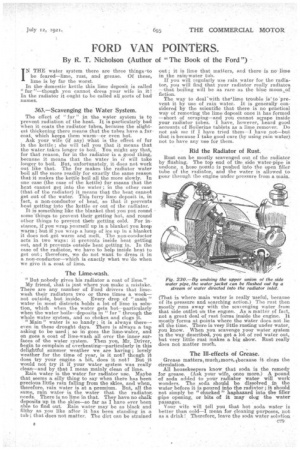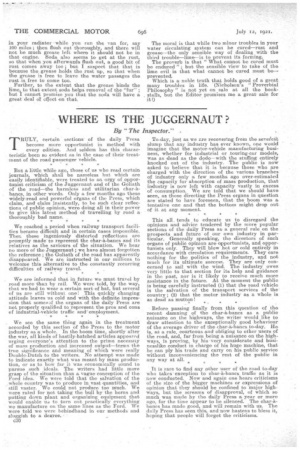FORD VAN POINTERS.
Page 25

Page 26

If you've noticed an error in this article please click here to report it so we can fix it.
By R. T. Nicholson (Author of "The Book of the Ford ")
IN THE water system there are three things,to be feared—lime, rust, and grease. Of these, lime is by far the worst. In the domestic kettle this lime deposit is called " fur "—though you cannot dress your wife in it In the radiator it ought to be called all sorts of bad names.
363.—Scavenging the Water System.
The effect of "fur" in the water system is to prevent radiation of the heat. It is particularly bad when it coats the radiator tubes, because the slightest. thickening there means that the tubes have a fur, coat, which keeps them warm—or even hot. Ask your wife (if any) what is the effect of fur in the kettle ; she will tell you that it means that the water takes longer to boil. You might say that, for that reason, fur in the radiator is a good thing, because it means that the water in it will take longer to bail. But, unfortunately, it does not work out like that. The fur makes the radiator water boil all the more readily for exactly the same reason that it makes the kettle boil all the more slowly. In one case (the case of the kettle) fur means that the heat cannot get into the water ; in the other case (that of the radiator) it means that the beat cannot get out of the water. This furry lime deposit is, in fact, a non-conductor of heat, so that it prevents heat getting into the kettle or out of the radiator.
It is something like the blanket that you put round some thingsto prevent their getting hot, and round other things to prevent theii getting cold. For instance, if you vrap yourself up in a blanket you keep warm; but if you wrap a lump of ice up in a blanket it does not get warm and melt. The noreconduetor acts in two ways: it prevents inside heat getting out, and it prevents outside heat getting in. In the case of the radiator, we have to help inside heat to get out; therefore, we du not want to dress it in a non-conductor—which is exactly what we 'do when we give it a coat of lime.
• The Lime-wash.
"But nobody gives his radiator a coat of lime."
My friend, -chat is just where you make a mistake. There are any number of Ford drivers that limewash their radiators two or three times a week—
not outside, but inside. Every drop of " main " water in most districts holds a Jot of lime in solution, which When the water gets hot—particularly when the water boils—deposits in "fur' through the whole water system, and so chokes and clogs it. " Main " water is so handy ; it is always there— even in these drought days. There is always a tap asking to be used ; so in goes the lime-water, and on goes a coat of lime-wash all over the inner _surfaces of the water system. Then you, Mr. Driver, begin to complain of overheating—particularly in this delightful summer weather we are having ; lovely weather for the time of year, is it not'? though it does try your engine a bit, does it not? But it would not try it if your water system was really dean—and by that I mean mainly clean of lime.
Rain water is the water for radiator use. Maybe that seems a, silly thing to say when there has been precious little rain falling from the skies, and when, therefore, rain water is at a premium. But, all the same, ram water is the water that the radiator, needs. There is no lime in that. They have no chalk deposits up in the skies—so far as I have ever been able to find out. Rain water may be as black and filthy as you like after it has been standing in a tub ; that does not matter. The dirt can be strained
out; it is lime that matters, and there is no lime in the rain.-water tub. If you will regularly use rain water for the radiator, you will find that your radiator really radiates --that boiling will be as rare as the blue moon, of fiction.
The way to dear'with the' lime trouble is'to 'prevent it by use of rain water. It is generally considered by the scientific that there is no practical way of removing the lime deposit once it has formed --short of scraping—and you cannot serape inside your radiator tubes. have, however, heard good accounts of Boilerine tablets as a lime remover. Do not ask me if I have tried them-4 have not—but that is because I take good care (by using rain water) not to have any use for them.
Rid the Radiator of Rust.
Rust can be mostly scavenged out of the radiator by flushing. The top end of tile side water-pipe is undone, a hose nozzle is pushed into the open filler tube of the radiator, and the water is allowed to pour through the engine under pressure from a main.
(That is where main water is really useful, because of its pressure and searching action.) The rust then mostly runs away with the scavenging water from that side outlet on the engine. As a matter, of fact, not a great deal of rust farms inside the engine. It mostly forms at points where the Water does not lie all the time, Thera is very little rusting under water, you know. When you scavenge your water system in the way described, you get a lot of red water out, but very little rust makes a big show. Rust really does not matter much.
The III-effects of Grease.
Grease mattersonuchmore.ibecause it clogs the circulation.
All housekeepers know that soda is the remedy for grease. (Ask your wife, once more.) A pound of soda added to your radiator water will work wonders. The soda should be dissolved in the water before it is poured into the radiator; • it should not simply be " chucked " haphazard into. the filler pipe opening, or bits of it may oluz the water passages.
Your wife will tell you that hot soda water is better than cold—I mean for cleaning purposes, not as a drink! Therefore, leave the soda water solution c'29
in your radiator while you run the van for, say 100 miles; then flush out thoroughly, and there will not be much grease left where it should not be in that engine. Soda also seems to get at the rust, so that when you afterwatds flush out, a good bit of rust comes away too ; but I suspect that that is because the grease holds the rust up, so that when the grease is free to leave the water passages the rust is free to come too.
Further, to the extent that the grease binds the lime, to that extent soda helps removal of the "fur" ; but I earnacrt promise you that the soda will have a great deal of Qffeet on that.
The moral is that while two minor troubles in your water circulating system can be cured—rust and grease—the only sensible way of dealing with the third trouble—lime—is to prevent its forming. The proverb is that "What cannot be cured must be endured " ; but the sensible view to take of the lime evil is that what cannot be cured must be— prevented. Which is a noble truth that holds good of a great many troubles in life. (Nicholson 's "Proverbial Philosophy" is not yet on sale at all the bookstalls, but the Editor promises me a great sale for it!)
































